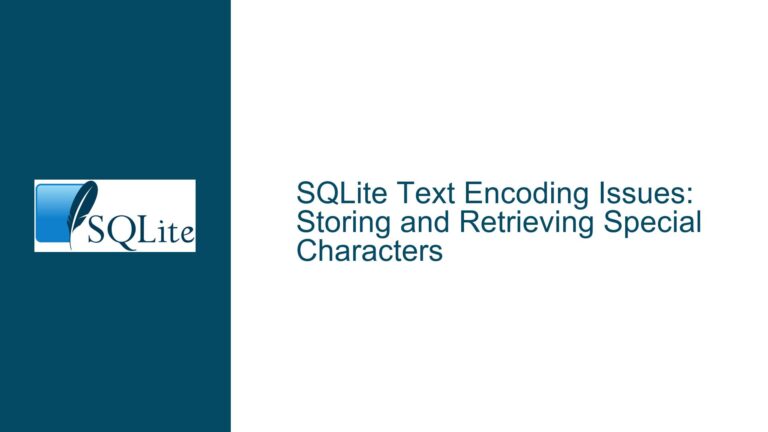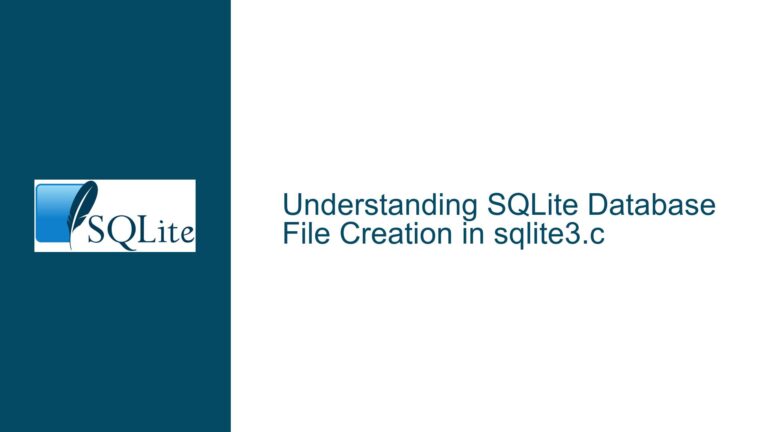SQLite ICU Extension Load Failure on Windows: Troubleshooting and Solutions
Issue Overview: SQLite ICU Extension Fails to Load on Windows with Python 3.9.9
The core issue revolves around the inability to load the SQLite ICU extension on a Windows system when using Python 3.9.9. The ICU (International Components for Unicode) extension is crucial for enabling advanced Unicode support in SQLite, such as case-insensitive comparisons and sorting for non-ASCII characters. While the extension works seamlessly on Linux, either through pip installation or manual compilation, Windows presents a series of challenges that prevent successful loading.
The primary symptoms include:
- "The specified module could not be found": This error occurs when attempting to load the compiled ICU extension (
libSqliteIcu.dll) using Python’ssqlite3module. - "The specified procedure could not be found": After renaming the DLL to
icu.dllto match the expected initialization function (sqlite3_icu_init), this error indicates that the extension’s entry point is not being recognized. - DLL load failure for
_sqlite3: When replacing the defaultsqlite3.dllwith a custom-compiled version that includes ICU support, Python fails to load the_sqlite3module altogether.
These issues suggest a combination of problems related to DLL dependencies, compilation settings, and Python’s integration with SQLite on Windows. The discussion also highlights that alternative extensions, such as sqlite3_unicode, can provide similar functionality without the same level of complexity, but they do not fully address the underlying problem with the ICU extension.
Possible Causes: Why the ICU Extension Fails on Windows
The failure to load the SQLite ICU extension on Windows can be attributed to several factors, each of which must be carefully examined to identify the root cause. These factors include:
1. Incorrect or Missing DLL Dependencies
The ICU extension relies on additional libraries, specifically icuuc.dll and icuio.dll, which provide the core Unicode and I/O functionality. On Windows, these dependencies must be explicitly linked during compilation and made available at runtime. If these DLLs are missing or not properly linked, the ICU extension will fail to load. Unlike Linux, where package managers often handle dependencies automatically, Windows requires manual intervention to ensure all required libraries are present and accessible.
2. Mismatched Compilation Settings
The compilation process for the ICU extension involves specific flags and linker settings that must align with the target environment. For example:
- The
-DSQLITE_ENABLE_ICUflag must be included to enable ICU support in SQLite. - The
pkg-configtool is used to fetch the correct compiler and linker flags for ICU, but this tool is not natively available on Windows. Using MSYS2 or MinGW to emulate this functionality can introduce inconsistencies, especially if the ICU libraries are not correctly installed or configured. - The choice between dynamic and static linking can also impact the extension’s behavior. Dynamic linking requires all dependencies to be available at runtime, while static linking embeds them into the DLL, potentially avoiding runtime issues but increasing file size.
3. Python’s SQLite Integration
Python’s sqlite3 module is tightly coupled with the SQLite library, and the version of SQLite bundled with Python may not support ICU extensions. Replacing the default sqlite3.dll with a custom-compiled version can resolve this, but it introduces additional complexity:
- The custom DLL must be compatible with Python’s internal expectations, including the correct initialization functions and symbol exports.
- If the custom DLL is compiled with ICU support but lacks the necessary dependencies, Python will fail to load the
_sqlite3module entirely.
4. File Naming and Initialization Function Mismatch
The ICU extension’s initialization function, sqlite3_icu_init, must match the filename and be exported correctly. Renaming libSqliteIcu.dll to icu.dll is a common workaround, but it does not address the underlying issue of missing or incorrectly linked dependencies. Additionally, the extension’s entry point must be explicitly defined in the source code and exported during compilation.
5. Environment and Path Configuration
Windows relies on the %PATH% environment variable to locate DLLs at runtime. If the ICU dependencies are not in a directory included in %PATH%, the extension will fail to load. This issue is particularly common when using custom-compiled DLLs, as they may depend on libraries that are not part of the standard system paths.
Troubleshooting Steps, Solutions & Fixes: Resolving ICU Extension Load Failures
To address the issues outlined above, follow these detailed troubleshooting steps and solutions. Each step is designed to isolate and resolve a specific aspect of the problem, ensuring a comprehensive approach to fixing the ICU extension load failure on Windows.
1. Verify and Install ICU Dependencies
Before attempting to compile or load the ICU extension, ensure that the required ICU libraries are installed and accessible. On Windows, this involves:
- Downloading the ICU binaries from the official ICU website or a trusted source. Ensure the version matches the one used during compilation.
- Placing
icuuc.dllandicuio.dllin a directory included in the%PATH%environment variable. Alternatively, place them in the same directory as the ICU extension DLL.
To verify the installation, use the Dependency Walker tool to analyze libSqliteIcu.dll or icu.dll. This tool will identify any missing or unresolved dependencies, providing a clear path to resolving them.
2. Compile the ICU Extension with Correct Settings
Compiling the ICU extension on Windows requires careful attention to compiler and linker settings. Follow these steps:
Install MSYS2 or MinGW to provide a Unix-like environment for compilation. Ensure the necessary development tools, including
gccandpkg-config, are installed.Use the following command to compile the ICU extension:
gcc -shared icu.c `pkg-config --libs --cflags icu-uc icu-io` -o icu.dllThis command ensures that the ICU libraries are correctly linked and that the output file is named
icu.dllto match the initialization function.If
pkg-configis not available, manually specify the include and library paths:gcc -shared -I<icu_include_path> -L<icu_lib_path> icu.c -licuuc -licuio -o icu.dllReplace
<icu_include_path>and<icu_lib_path>with the actual paths to the ICU headers and libraries.
3. Replace Python’s SQLite Library with a Custom Version
To ensure compatibility with ICU extensions, replace the default sqlite3.dll bundled with Python with a custom-compiled version. Follow these steps:
- Download the SQLite amalgamation source code from the official website.
- Compile the amalgamation with ICU support using the following command:
gcc -shared -O2 -DSQLITE_ENABLE_FTS5 -DSQLITE_ENABLE_RTREE -DSQLITE_ENABLE_COLUMN_METADATA -DSQLITE_ENABLE_ICU sqlite3.c -I<icu_include_path> -L<icu_lib_path> -licuuc -licuio -o sqlite3.dll - Replace the existing
sqlite3.dllin Python’s installation directory with the newly compiled version. Ensure the ICU dependencies are accessible as described in Step 1.
4. Load the ICU Extension in Python
Once the ICU extension and its dependencies are correctly configured, load the extension in Python using the following code:
import sqlite3
conn = sqlite3.connect('library.db')
conn.enable_load_extension(True)
conn.load_extension('./icu')
If the extension loads successfully, test its functionality by executing a query that relies on ICU features, such as a case-insensitive comparison or Unicode-aware sorting.
5. Use Alternative Extensions as a Fallback
If the ICU extension proves too difficult to configure, consider using alternative extensions that provide similar functionality. For example:
- The
sqlite3_unicodeextension offers basic Unicode support, including case-insensitive comparisons and sorting. Compile it using:gcc -shared sqlite3_unicode.c -o unicode.dll - The
sqleanrepository provides prebuilt extensions for Windows, macOS, and Linux, including Unicode support. Download the appropriate DLL and load it in Python as described above.
While these alternatives may not offer the full range of ICU features, they provide a practical solution for many use cases without the complexity of configuring the ICU extension.
6. Debugging and Advanced Configuration
For advanced users, additional debugging and configuration steps can help resolve persistent issues:
- Use
Dependency Walkerto analyze the ICU extension and its dependencies, identifying any missing or mismatched libraries. - Experiment with static linking to create a self-contained ICU extension that does not rely on external DLLs. This approach increases file size but simplifies deployment.
- Consult the SQLite and ICU documentation for advanced compilation options and troubleshooting tips.
By following these steps, you can successfully configure and load the SQLite ICU extension on Windows, enabling advanced Unicode support in your SQLite databases. While the process is complex, the benefits of ICU functionality make it a worthwhile endeavor for applications requiring robust internationalization features.






